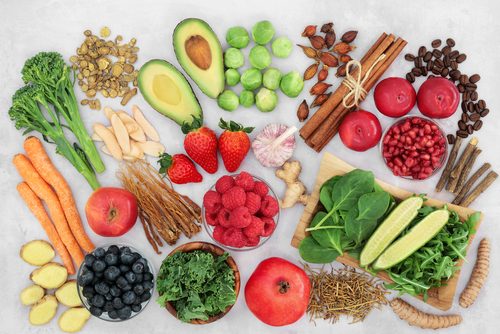A growing body of research suggests that the foods we consume can significantly impact our risk of developing chronic diseases like dementia, type 2 diabetes, and heart disease. Recent studies have highlighted the benefits of an anti-inflammatory diet, emphasizing whole grains, fruits, and vegetables while minimizing processed meats, sugary foods, and other ultra-processed items. These dietary choices are not just a matter of managing weight or energy levels—they can also be powerful tools in reducing inflammation, a key factor in many chronic conditions.
The Importance of Anti-Inflammatories

Anti-inflammatory foods play a crucial role in maintaining overall health by combating chronic inflammation, which is a key contributor to many diseases, including dementia, type 2 diabetes, and heart disease. By reducing inflammation in the body, these foods help protect cells from damage, support immune function, and improve cardiovascular health. Incorporating anti-inflammatory foods like leafy greens, berries, nuts, and fatty fish into your daily diet can significantly lower the risk of developing these chronic conditions, promoting long-term wellness and vitality.
The Power of an Anti-Inflammatory Diet

An anti-inflammatory diet has been shown to lower the risk of dementia by 31%, even in individuals already diagnosed with conditions like type 2 diabetes, heart disease, or stroke. According to a study published in JAMA Network Open, people who followed this diet developed dementia two years later than those who consumed more inflammatory foods.1
Dr. Abigail Dove, the lead author of the study, explains, “Following an anti-inflammatory diet was related to lower risk of dementia, even among people with cardiometabolic diseases who are already at elevated risk of dementia”. This diet, rich in vitamins, carotenoids, and flavonoids, helps neutralize free radicals and reduce inflammatory markers in the body, potentially staving off neurodegeneration and vascular injury in the brain.
2. The Dangers of Ultraprocessed Foods

On the flip side, diets high in ultra-processed foods are lead to a higher risk of early death and chronic diseases. A study from France found that every 10% increase in ultraprocessed food consumption was associated with a 14% higher risk of early death.2 These foods, which include sugary snacks, processed meats, and ready-to-eat meals, are often loaded with additives and chemicals that contribute to inflammation and other health issues – leading to a need for a more anti-inflammatory diet.
Nurgul Fitzgerald, an associate professor of Nutritional Sciences at Rutgers University, emphasizes, “We are living in a fast world, and people are looking for easier solutions. But getting your hands on ultraprocessed foods comes at a high cost to our health”. The study also reveals that ultraprocessed food consumption leads to higher body mass index (BMI), lower physical activity levels, and a range of socio-economic factors, highlighting the complex nature of diet-related health risks.
Read More: 7 Signs of Dementia That Appear As Early As 18 Years Before Diagnosis
3. Cardiovascular Health and Dietary Choices

The impact of diet on cardiovascular health is well-documented. A study following over 200,000 participants from the Nurses’ Health Study and Health Professionals Follow-up Study found that pro-inflammatory diets significantly increased the risk of cardiovascular disease (CVD).3 Those with the highest levels of dietary inflammation had a 38% higher risk of CVD compared to those with the lowest levels.
The study further indicated that individuals with higher inflammatory diets had higher levels of proinflammatory biomarkers, which contribute to the development of heart disease and stroke. These findings underscore the importance of dietary patterns in managing inflammation and reducing the risk of heart-related conditions.
4. Better Brains and Longer Lives with Anti-Inflammatory Foods

Adopting an anti-inflammatory diet is not just about preventing dementia or cardiovascular diseases; it’s about enhancing overall health and longevity. The evidence suggests that reducing the intake of ultraprocessed and pro-inflammatory foods while increasing the consumption of fruits, vegetables, and whole grains can protect the brain and body from the ravages of chronic diseases.
As Dr. David Katz, a specialist in preventive and lifestyle medicine, points out, “It is highly likely that a higher quality, less inflammatory diet directly impacts multiple pathways related to brain and neurocognitive health over time”.
Conclusion

Incorporating more anti-inflammatory foods into your diet is a simple yet powerful strategy to reduce the risk of dementia, type 2 diabetes, and heart disease. By focusing on whole, healthy foods and minimizing ultraprocessed items, you can make a significant impact on your long-term health. As research continues to evolve, the message remains clear: What you eat today can shape your health tomorrow.
Read More: Consumption Of This Oil Is Linked to Dementia Mortality
Sources
- “Eating these foods lowers dementia risk, even with type 2 diabetes and heart disease, study says.” CNN. Sandee LaMotte. August 2024.
- “Avoiding ‘ultraprocessed’ foods may increase lifespan, study says.” CNN. Susan Scutt. March 6, 2019.
- “Dietary Inflammatory Potential and Risk of Cardiovascular Disease Among Men and Women in the U.S..” JACC. Jun Li, Dong Hoon Lee, Jie Hu, Fred K. Tabung, Yanping Li, Shilpa N. Bhupathiraju, Eric B. Rimm, Kathryn M. Rexrode, JoAnn E. Manson, Walter C. Willett, Edward L. Giovannucci, and Frank B. Hu. November 2020.

